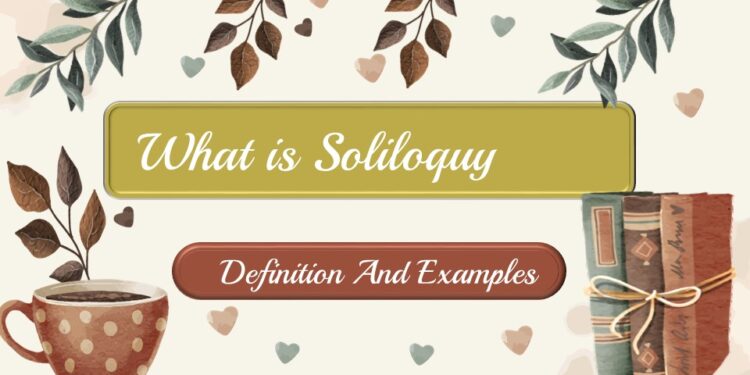What is Soliloquy Definition And Examples
Soliloquy is a dramatic device employed in plays, offering a unique window into a character’s thoughts and feelings. What is Soliloquy Definition And Examples Derived from the Latin word “soliloquium,” meaning “to speak alone,” a soliloquy allows a character to express their innermost musings, desires, conflicts, and emotions while alone or unobserved on stage.
This powerful theatrical technique has been used for centuries, captivating audiences and providing deep insights into the human condition. What is Soliloquy Definition And Examples Delves into the nature and significance of soliloquies, tracing their origins, examining their purpose, and exploring their enduring relevance in both classical and modern theater.
I. Origins and Development of Soliloquy:
A. Ancient Roots: The roots of soliloquies can be traced back to ancient Greek theater, where characters often addressed the chorus or gods directly, conveying their thoughts and emotions.
B. Shakespearean Influence: William Shakespeare is renowned for his masterful use of soliloquies, elevating them to new heights of dramatic intensity and poetic beauty.
C. Evolution and Adaptation: Soliloquies have evolved over time, taking different forms and serving varying purposes in different theatrical traditions and cultural contexts.
II. Purpose and Function of Soliloquies:
A. Character Exploration: Soliloquies provide an intimate glimpse into a character’s mind, enabling the audience to understand their motivations, conflicts, and complexities on a deeper level.
Also Read-
- What is Simile Definition And Examples
- What is Setting Definition And Examples
- What is Satire Definition And Examples
B. Exposition and Plot Advancement: Soliloquies can convey crucial information, reveal hidden truths, or foreshadow future events, propelling the plot forward.
C. Emotional Expression: Soliloquies allow characters to express their innermost thoughts, feelings, and struggles, providing catharsis for both the character and the audience.
D. Dramatic Irony: Soliloquies can create dramatic irony by juxtaposing a character’s private thoughts with their public actions or by revealing information unknown to other characters.
III. Shakespearean Soliloquies :
A. Hamlet’s “To be or not to be” Soliloquy: This iconic soliloquy showcases Hamlet’s contemplation of life, death, and the moral complexities of existence. It reveals his internal turmoil, his philosophical ponderings, and his indecisiveness.
B. Macbeth’s “Is this a dagger which I see before me?” Soliloquy: In this haunting soliloquy, Macbeth grapples with his guilt and inner demons before committing regicide. It offers insights into his deteriorating mental state and the allure of power.
C. Juliet’s Balcony Soliloquy: Juliet’s soliloquy in Shakespeare’s “Romeo and Juliet” expresses her love for Romeo, her struggle with their feuding families, and her willingness to defy societal expectations for the sake of their forbidden love.
IV. Modern Soliloquies:
A. Psychological Exploration: Modern playwrights often use soliloquies to delve into the depths of a character’s psyche, exploring themes of identity, trauma, and self-discovery.
B. Social Commentary: Soliloquies can be employed to critique societal norms, challenge injustices, or shed light on pressing social issues.
C. Emotional Intimacy: By breaking the fourth wall, soliloquies establish a direct connection between the character and the audience, fostering empathy and creating a sense of shared experience.
Conclusion
Soliloquies in theater have remained a timeless and captivating device that provides a deep understanding of characters and the human condition. What is Soliloquy Definition And Examples From their origins in ancient Greek theater to their refined use by Shakespeare and their modern adaptations, soliloquies continue to play a significant role in engaging and enlightening audiences.
They offer a glimpse into the inner workings of characters, advancing the plot, expressing emotions, and providing a platform for social commentary. Soliloquies invite the audience to participate in the character’s journey, fostering empathy and connection. What is Soliloquy Definition And Examples Their power lies in their ability to reveal thoughts and feelings that characters may not express in dialogue or action, allowing for a profound exploration of motivations, conflicts, and personal dilemmas. What is Soliloquy Definition And Examples The soliloquy remains a testament to the enduring allure and impact of theater as a medium of storytelling and self-reflection.
FAQ.
Q. How does a soliloquy differ from a monologue?
Ans. A soliloquy is a specific type of monologue where a character speaks their thoughts or feelings when alone or unobserved. Monologues, on the other hand, refer to any extended speech delivered by a character, whether they are alone or in the presence of others.
Q. Why are soliloquies important in theater?
Ans. Soliloquies offer a unique opportunity for character exploration, emotional expression, and plot advancement. They allow the audience to gain deeper insights into a character’s motivations and conflicts, enhancing their understanding and engagement with the play. Soliloquies also provide a space for characters to express their innermost thoughts and feelings, creating emotional connections with the audience and enabling catharsis.
Q. How do soliloquies contribute to Shakespearean plays?
Ans. Soliloquies are integral to Shakespearean plays, serving as moments of introspection, philosophical contemplation, and emotional turmoil. They offer a glimpse into the complex minds of characters such as Hamlet, Macbeth, and Juliet, shedding light on their inner struggles, dilemmas, and motivations. Shakespeare’s soliloquies are known for their poetic beauty, dramatic intensity, and profound insights into human nature.
Q. Can soliloquies be found in modern plays?
Ans. Yes, soliloquies are still used in modern plays and have evolved to reflect contemporary storytelling. Playwrights employ soliloquies to explore psychological depths, challenge societal norms, and create emotional intimacy with the audience. Soliloquies remain a powerful tool for character development, providing a platform for introspection, self-discovery, and social commentary in modern theater.
Q. What is the impact of soliloquies on the audience?
Ans. Soliloquies invite the audience into the character’s world, allowing them to experience the character’s thoughts, emotions, and struggles firsthand. They create a sense of empathy, enabling the audience to connect with the characters on a deeper level. Soliloquies also provide moments of reflection and contemplation for the audience, as they are privy to the character’s private thoughts and can relate them to their own lives and experiences.
















